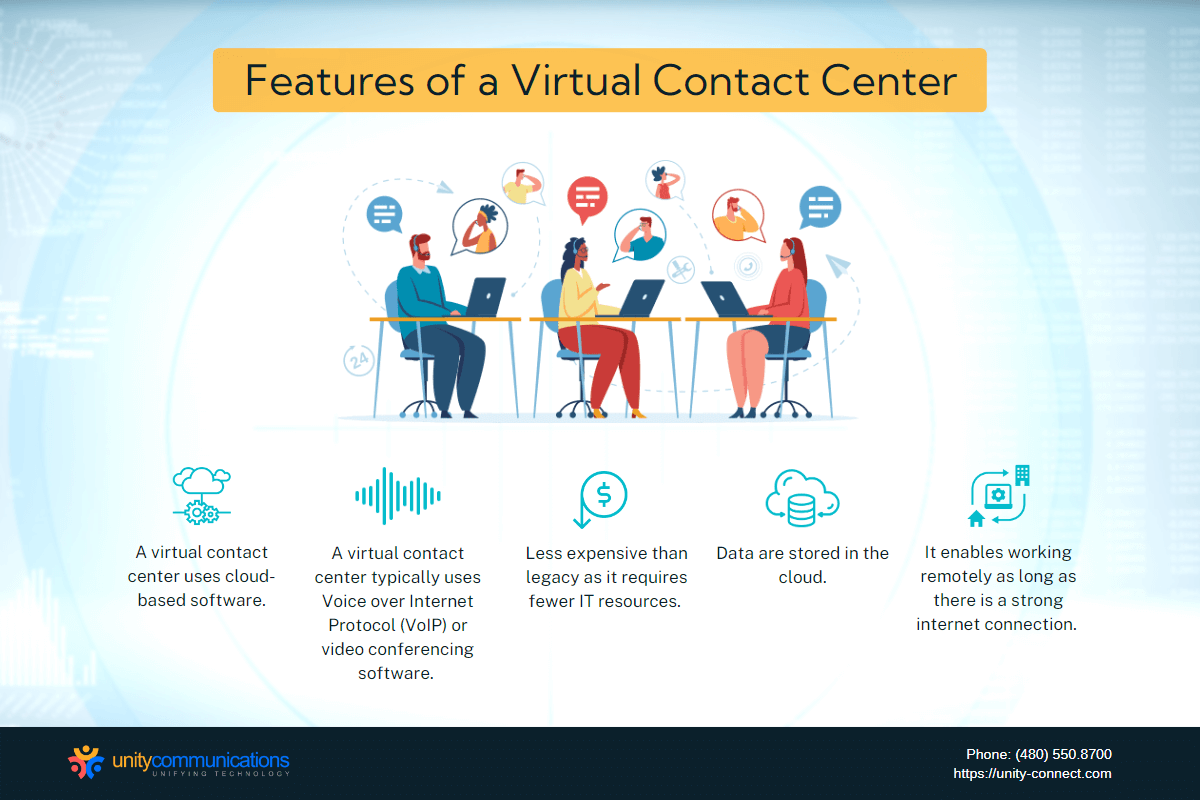Table of Contents
The contact center as a service (CCaaS) industry is experiencing massive growth. Rapid technological development, social media, and changing consumer behavior drive this growth. Because superior customer support is synonymous with 24/7 availability and omnichannel support, more companies are gravitating toward virtual call centers.
This article explores virtual contact centers. It also discusses the advantages and disadvantages of these cloud-based hubs.
What Is a Virtual Contact Center?

Without a physical facility, a virtual contact center manages questions and issues from multiple channels, including phone calls, live chat, email, and social media. Legacy contact centers house their technical equipment and agents in a specialized office. Meanwhile, cloud computing has made virtual centers possible. With hosted hardware, physical facilities have become unnecessary.
Adopting a virtual center saves on costs because companies do not need to pay for a physical office or lease space and equipment. A hosted contact center means partnering with an external service provider. Servers and system update purchases are part of what this provider handles. The partnership eliminates in-house IT overhead and software maintenance.
However, virtual centers have some challenges, primarily due to remote working. Companies face issues with security and data maintenance. Keeping agents engaged with the team and ensuring agent productivity are also challenges.
Fortunately, tools exist to help with this. Managers, for instance, can monitor agents using live listening, quality monitoring, and reporting features. Supervisors can also oversee team engagement using dashboards and collaboration tools.
How Do Virtual Contact Centers Work?

A virtual contact center operates on cloud-based software, is deployed and customized by in-house developers, and is scaled as necessary. These centers primarily utilize Voice over Internet Protocol (VoIP) or video conferencing tools. A significant advantage of virtual centers over traditional ones is their reduced need for IT resources, making them more cost-effective.
Such centers store their data in the cloud, allowing agents to access it from any location. This setup enables representatives to work efficiently from remote locations with a reliable internet connection. As a result, they can assist customers across various time zones and geographical locations while incurring lower costs than traditional onsite contact centers.
Cloud contact centers are adept at managing both inbound and outbound tickets, facilitating seamless interaction between agents and customers as required. Inbound tickets typically involve queries from potential customers seeking assistance with services or products, ranging from account management and technical support to handling complaints and other related issues.
For holistic customer support, a robust cloud-based contact center uses the following:
- Omnichannel routing involves interaction and routing management. This feature can include interaction channel support, interactive voice response, an automatic call distributor (ACD), and a proactive outbound dialer.
- Analytics turns data into actionable results by making reports relevant, digestible, and easy to consume. This feature includes reporting and performance management, customer surveys, and interaction analysis.
- Workforce optimization unlocks your team’s potential. Contact centers use this to track quality and monitor performance.
- App integration, such as CRM and UCaaS, offers a holistic contact center solution that elevates customer experiences for businesses across all sizes.
- Open cloud foundation allows quick innovation with an enterprise-grade solution that implements quickly, scales securely, and serves consumers globally.
Advantages of a Virtual Contact Center

The transition to a virtual workforce has demonstrated the viability of remote operations for numerous companies. A virtual contact center benefits agents, customers, and business owners significantly.
The trend towards cloud-based centers is gaining momentum; as per a survey, migrating systems to the cloud ranked as the 9th most important customer experience and contact center goal for 2023. Nearly 20% of respondents identified this, a significant increase from 15.5% in 2022. Here are the key advantages of using a cloud-based center:
Omnichannel Support
Modern customers demand omnichannel support. Many shoppers begin their journey online by emailing or messaging via social media. Hence, you must be available on their chosen platform.
Furthermore, Zendesk reports that 70% of customers don’t want to repeat themselves. They want their experience connected across these platforms. A good cloud contact center minimizes friction when interacting across various communication channels, which improves customer satisfaction.
Technological Readiness
Built from the ground up, a virtual customer support center supports internet telephony. It also supports remote agents and real-time calls. The improved infrastructure preparedness allows businesses to face future challenges and enhance operations.
Customization and Integration
Cloud contact centers don’t use private branch exchange (PBX) systems or specific telephone models. Thus, integrating customer relationship management or analytics tools via a cloud center is easy. Some vendors provide their own API, letting you integrate with any business tool you need.
A reputable cloud contact center connects your virtual customer service with your existing processes. Customize it based on your use case.
Easy Deployment, Design, Support, and Training
Spend less time managing a customer service department with a virtual center. That means more time for critical business operations. Hiring a reputable cloud contact center lets you tap into network architects and project managers. These experts help you create, implement, onboard, and support your team for better process efficiency.
Good Return on Investment
A robust virtual customer service center provides a better return on investment (ROI). Increasing customer satisfaction levels and improving employee productivity make it possible. Such ROI immediately impacts your overall business operations.
Moreover, having separate teams for inbound and outbound support is unnecessary. The contact center agents seamlessly switch between the two, saving you money.
Geographic Adeptness
Cloud contact center agents don’t have to concentrate on a single location because of the infrastructure setup. Consequently, they operate more independently than other smaller contact centers. Companies that operate across the globe and serve customers from various countries benefit most from this.
Adaptability and Scalability
Some industries, such as e-commerce, are already familiar with seasonal demand. Another benefit of a virtual customer service center is that you never worry about off- or peak seasons. Whether you need 25 or 200 agents, a cloud call center ramps up operations easily, depending on your business requirements.
Improved Agent Efficiency
Because agents work remotely anywhere, they are happier, more relaxed, and more productive.
Contact centers also stagger agents based on different time zones. With that, they handle ticket volume variations. Managers do not need to coordinate multiple centers around the globe.
Emergency Preparedness
Centralizing your contact center in one location is a risky proposition. There might not be a backup to serve customers in case of a power outage, fire, or other natural calamities.
Avoid this problem altogether by using a cloud contact center. Virtual centers depend on redundancy, helping them prepare well for emergencies.
Disadvantages of a Virtual Contact Center

While a virtual contact center has many advantages, it also has several challenges. Still, choosing the right virtual call center solution and proper communication helps address such disadvantages. Here is a closer look at the potential disadvantages of cloud contact centers.
Employees Feel Isolated
Three-quarters of WFH employees have high expectations for remote work. The setup requires significant adjustments for those used to socializing at the office. Remote employees might feel isolated from their team and the organization.
Therefore, fostering a culture of collaboration and communication is necessary. Ensure employees feel part of the team and are comfortable raising their concerns. Do this by letting them get to know each other and holding a weekly video call to check in on them.
Encourage asynchronous interaction. Use apps like MS Teams, Slack, or proprietary internal chat software. Also, allow coworkers to communicate even when they’re not online simultaneously.
Cybersecurity Threats
Cloud contact centers have higher exposure to cyber threats than their on-premise counterparts. It’s easier to guard an onsite network than one with multiple access points.
Ensure your contact center platform has robust security measures to protect your business, employees, and customer data. Moreover, regularly train employees in security best practices to prevent cyber threats.
Steep Learning Curve and Rigid Software
Some cloud contact center solutions lack programmability options, making them hard to use. The steep learning curve can lead to a longer onboarding process. It can also reduce efficiency and create constant workflow adjustments.
Find a contact center solution that is easy to navigate and configure. Choose a customizable tool to fit your unique needs, not one that forces you to follow a single way of doing things.
The Bottom Line
Virtual centers adeptly handle customer service tickets through efficient cloud-based solutions. Their benefits encompass an easy-to-use web interface, comprehensive reporting capabilities, minimal IT maintenance requirements, and a wide range of powerful features.
As workplace dynamics evolve, both companies and their representatives stand to gain considerably from embracing the virtual contact center model. Cloud centers’ steadfast presence and increasing relevance in the business landscape are undeniable. They are pivotal in addressing labor shortages and ensuring an exceptional customer experience.
For more information on leveraging the potential of virtual contact centers for your business, don’t hesitate to contact Unity Communications. We’re here to guide you through the process and help you harness the full power of this innovative solution.




